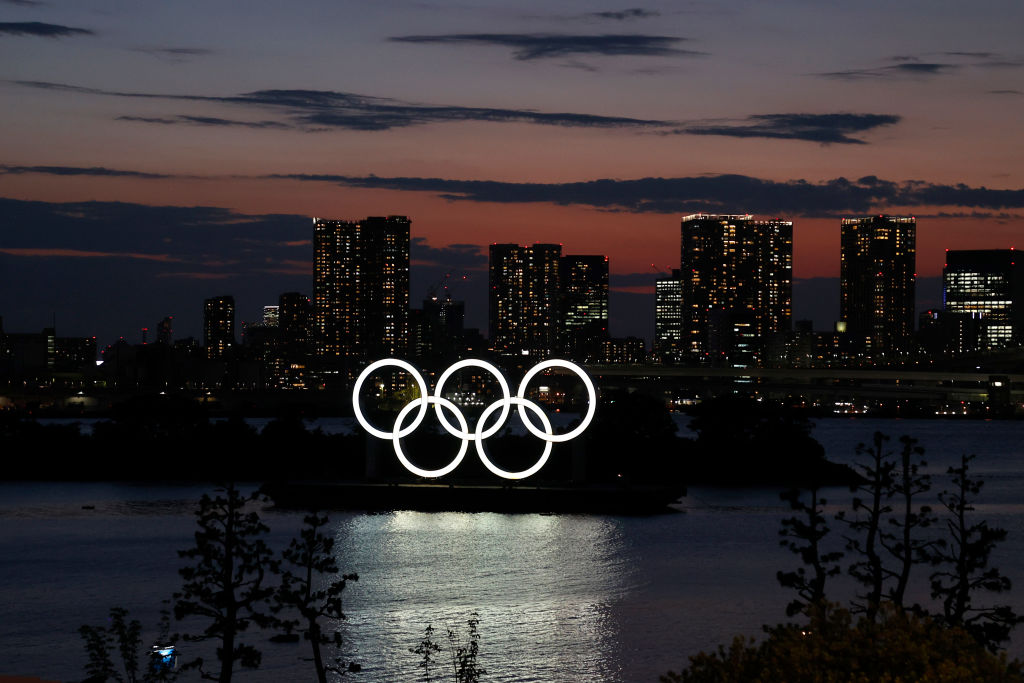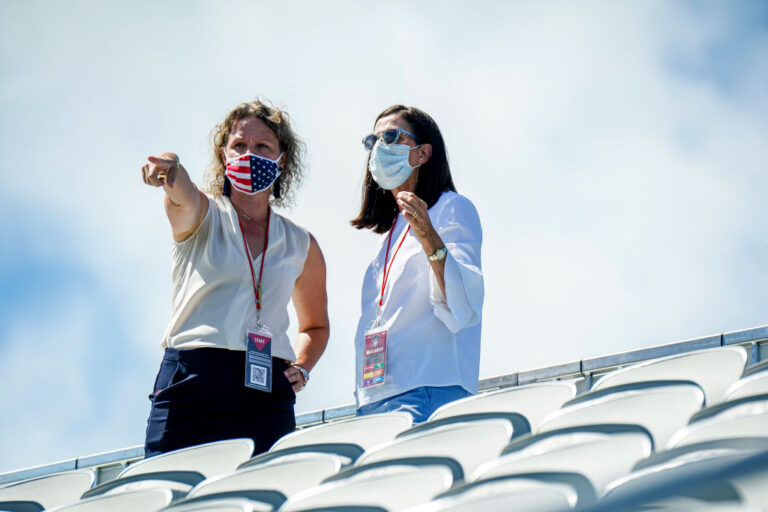The Olympic Games Keep Breaking Their Budgets. Can Skyrocketing Costs Be Controlled?
Why this matters
Like every modern Olympics before them, the Tokyo Games are over budget. A scholar who has studied the problem explains why the Olympics consistently cost so much more than initially planned—and what steps can be taken to bring sky-high overruns under control.
The Tokyo Olympics are over budget. Way, way over. With an official price tag of $15.4 billion—and an estimated actual cost of at least $25 billion—this summer’s Olympics have blown past an initial $7.5 billion estimate, and likely will end up as the most expensive Games ever.
Well, at least until the next Olympics.
Like colorful outfits during the Parade of Nations and generous condom distribution in the athletes’ village, enormous cost overruns are an Olympic tradition. In fact, a recent analysis by three Oxford University scholars found that every Games since 1960 has run over budget by an average of 172 percent—a larger average than seen in the construction of giant dams, and one that places the Olympics in the same cost risk prediction category as (no, really) natural disasters and terrorist attacks.
To better understand why the Games consistently bust their budgets and how that can change, Global Sport Matters recently spoke with Alexander Budzier, a Fellow at Oxford’s Saïd Business School, large project management expert, and co-author of “Regression to the Tail: Why the Olympics Blow Up.” The following interview responses have been lightly edited for clarity and context, with some sections being cut for brevity.
Global Sport Matters: The Olympics are fun. They’re often inspiring. They make for great TV. And with an average cost since 1960 of $6 billion for the Summer Games and $3.1 billion for the Winter Games, they are anything but cheap. What should cities and countries bidding for the Olympics know about the costs of hosting the Games?
Alexander Budzier: Exactly what you said! It’s not cheap. With the cost itself, there’s an element that has to do with running the Olympics for two weeks, the greatest show on Earth. And then, as we now see in Tokyo, and as we saw in Rio, and that we always see, there’s what the whole thing costs—all of the surrounding investments in infrastructure. And that’s at least half of the total cost.
If we take Tokyo as an example, there’s about $6 billion that is the cost of actually staging and running the events for two weeks. And that is just about met by the various revenues cities are able to raise, even though we know there are some questions about whether those are in cash or, as is often the case, in in-kind donations. But on paper, at least, that is covered. Only then you have another $10 billion, sometimes more, that you invest in stuff like stadiums, athletes’ villages, broadcast centers, and transportation upgrades. And some of those costs aren’t even included in the costs we studied.
So one of the greatest questions for any city or country embarking on [hosting the Games] is affordability. Can you afford it? And if you're investing in it, are you investing your money wisely? Do you really have a plan for what to do with all that infrastructure afterwards? If you don’t, then there certainly is an element of proceed with caution, and really know what you are getting yourself into.
GSM: Just to clarify—your study of Olympic costs and cost overruns doesn’t cover all of the infrastructure costs that come with hosting?
Budzier: No, we were looking at what we call “direct sports-related investments.” That includes the stadiums, the media and broadcasting centers, the athletes’ villages. But it doesn’t include things like upgrading your airport, or expanding a metro, or building a light railway station to serve the Olympic area.
GSM: That sounds like sports-stadium construction costs in the United States that don’t include building a new highway interchange next to the stadium, or upgrading the electrical or water infrastructure in that area, all of those other necessary infrastructure things. You have to pay for them, too, but they’re not on the official budget.
Budzier: They’re not on that budget. And that means it's very difficult to compare those expenses between the different Olympics. These kinds of additional investments are typically not captured in the "bid books" that are put together when places bid for hosting the Games.
Those books are one of the main sources of data that we looked at. They very much focus on what is needed to host the Games, and not necessarily on what is needed to get people to them.
GSM: Who actually pays for the costs of putting on the Games? Is there a difference between who pays for the budgeted costs and who pays for any overruns?
Budzier: With the cost of running the events, the IOC [International Olympic Committee, a non-governmental organization based in Switzerland that organizes the Games], always claims that sponsorship, television rights, and whatever the IOC gives to the host cities covers those costs. But that doesn’t pay for any of the facilities or other stuff we discussed. The host cities are on the hook for that, usually with [national] government-backed guarantees to pay for it—which ultimately means taxpayers.
GSM: You note in your paper that host cities have legally-binding obligations—that is, contacts with the IOC—to cover any cost overruns.
Budzier: Yes, and that is also part of the massive cost risk. When Rome dropped out of their Olympic bid [for the 2024 Games], one of the things the city’s mayor mentioned during their press conference was how the city hosted the 1960 Olympics and still hasn’t paid back those loans.
GSM: Your paper states that “we cannot count on organizers, the IOC, and governments to provide us with reliable information about the real costs, cost overruns, and cost risks of the Olympic Games.” Why not, and how does that effect trying to research and analyze these costs?
Budzier: It makes it very hard! There’s an apparent transparency over recent Games, with the bid books being public, and the cost estimate, and the final accounting also being public. But once you start looking into the individual Games, it is difficult to really find apples for apples comparisons between what goes in the bid books and what is given in the final accounts. You don’t quite know how the money was accounted for. For the Sochi Games, for instance, we still don’t know what the security costs were. Nobody has any idea.
GSM: So there’s no standardized way that different hosts and different Games keep their books?
Budzier: Technically, the local organizing committee books are there, and they sort of publish what they spend. You can follow up on that. But then, somehow, sometimes budgetary items just disappear. For Rio, for example, there were some documents published just before the Games where costs were split between the city, the region, and the state for things like refurbishing the Olympic Village into housing after the Games, things that later weren’t counted as official costs.
At first look, you can say, ‘yeah, it’s all very transparent.’ But once you start moving the numbers, it all becomes a little more complicated and fishy.
GSM: Speaking of fishy numbers, your paper looked at 30 Olympics between 1960 and 2016. For 11 of those Games, you were unable to find the estimated and actual costs of putting on the event. How is that possible?
Budzier: When we study projects in the United States, it’s possible to get quite good data going back to the New Deal. If you want to follow-up on the track record of the Tennessee Valley Authority, which built a lot of energy infrastructure in the U.S. in the 1930s, 1940s,1950s, you can get reliable data, because under [President] Roosevelt, it suddenly became a thing that if you spend public money, even as an arm's length body, you had better account for it. And for some odd reason, that is not the case for the [older] Olympic Games.
GSM: Olympic costs can be far more than host cities and countries can afford. For example, it took Montreal 30 years to pay off the debt incurred by the 720 percent cost overrun on the 1976 Summer Games. Of all the Games you looked at, what host suffered the greatest subsequent financial hit?
Budzier: In terms of extra money spent, it’s Tokyo. It’s unprecedented. In terms of consequences, that’s a bit of conjecture. But maybe the Athens Olympics. Greece hosted the Games, and then, suddenly, the state went bankrupt. Drawing a line between those two things is a bit of speculation, but it’s certainly something that once they had to start paying it back, there were problems.
Some countries can afford the Olympics. Others can’t. You know, my sympathies for Montreal. But ultimately, Canada is a rich country. I’m more worried about what is happening in the smaller economies.
GSM: By your accounting, the 2014 Sochi Games cost $21.9 billion. That made them the most expensive Games ever—at least until Tokyo—and also made Sochi more expensive than all previous Winter Games combined. Why did they cost so much?
Budzier: Everybody thinks it was corruption. That’s the working assumption. Nobody can prove it. But it’s unclear how you could spend so much on the different bits of infrastructure and how particular types of infrastructure could be so expensive. Like ice hockey, how much can you really spend on the stadium? The money must have gone to somebody, somewhere.
GSM: So what has happened with ballooning costs for the Tokyo Games? Is it the pandemic? Were cost overruns a problem before Covid?
Budzier: So, the official, announced budget in 2019 was $12.6 billion. After the pandemic and the Games being postponed, that rose to $15.4 billion. A state auditor has said that there are another $9.7 billion in costs that aren’t being accounted for and should be accounted for.
So pre-Covid, the Tokyo Games had at 73 percent cost overrun. Now it’s 111 percent according to their own calculations—and if you trust the state auditor, we’re talking about a 244 percent overrun. It’s hard to see what is due to covid and what isn’t, because to some extent those costs overlapped.
GSM: In the paper, you describe the budget for most megaprojects as the maximum value to be spent—but with the Olympics, you write, it is “more like a fictitious minimum” or a “down payment.” Why is that?
Budzier: The Olympics have a different spending profile compared to other projects. Normally, you have a little bit of a ramp up, then you have a lot of activity and spend a lot of money, and then it ramps down. The middle of a construction period is always the most work-intensive. So you end up with a bell-shaped kind of curve.
But the Olympics are always back-ended. The activity really happens toward the end of the Games cycle. So people are, to some extent, completely unrealistic about planning. It’s a long time period—seven to nine years—and in the first four years, nobody actually realizes how much things will change once they actually have to host the Olympics. There are always changes around security requirements, requirements for the media, all of that stuff.
Related: The 1968 Olympics in Mexico City
Another thing we hear over and over again from the Olympic cities is that they will just reuse their existing [sports and event] facilities. Which doesn’t really work. The requirements around the Olympics when it comes to security, when it comes to the media, etcetera, are so much higher than those for the stadiums that have already been built. People involved in the Games say that it often would be cheaper to demolish existing stadiums and build new ones than retrofit.
The other thing is that the people making bids don’t have a particular interest in putting together a realistic bid. They want to stage the Games! And they need to sell it to their country and the local population. A really realistic estimate of cost will probably not be a great selling point to get people on board.
GSM: Using statistical analysis, you conclude that the Olympics carry a 20 percent risk of a three-fold increase—or higher—in cost. That seems high! How does that risk compare to the risks of other megaprojects?
Budzier: It’s in the most extreme category of risks that we’ve found so far.
GSM: Your paper also states that Olympic cost overruns are “not just the unfortunate, happenstance incidents they appear to be, that are regrettable but will hopefully be avoided in the future, with more awareness and better luck. Instead, Olympic cost blowouts are systematic, ruled by a power law that will strike again and again, with more and more disastrous results.” Are you basically saying that Olympic cost overruns are not a bug, but rather a feature?
Budzier: I think that's a fair way to put it. It’s not like life insurance or the weather—things we can reasonably forecast, that sort of average out over time.
GSM: Let’s talk about reasons for Olympic cost overruns. Your paper lays out a number of explanations, starting with the fact that once a city decides to host the Games, it’s very difficult to reverse that decision—which leaves hosts in a “in for a penny, in for a pound” position.
Budzier: It’s very hard for a whole city to back out. Something severely bad must happen. If I remember correctly, Denver is the only Olympic host that said, “no, actually, we’re not going to do that.” The public voted against it. Otherwise, the pattern seems to be to throw good money after bad money.
GSM: Another reason for cost overruns is that Olympic hosts—and not the IOC—are legally obligated to cover them.
Budzier: That’s a point we make about governance structures. The IOC says they’re looking after the operational costs of the Games. If those increase, they can always find a bit more sponsorship money or whatever. But the IOC isn’t involved with the stadiums and all the other infrastructure. The host cities and countries pay for that.
Related: The Lived Experience of a Transgender Athlete, Part 2
In projects, you always talk about balancing your cost, your schedule, and your scope. With the Olympics, the schedule is defined. You know exactly when the opening date is going to be. In normal times, that is not going to be moved. Similarly, the scope tends to expand. The governing body for swimming will say, “Okay, your aquatic center must have these specifications for the pool, and these specifications for the warm-up rooms.” And you just have to do it. You need to deliver, and you have no influence over saying “no, let’s do it later or cheaper.” So something has to give, and that ends up being the costs.
GSM: Your paper also lays out recommendations for lowering Olympic costs and cost overruns, including budgeting more money up front for contingencies; making the IOC more responsible for paying for cost overruns; shortening the delivery period for the Games; and even having cities walk away from hosting altogether. Which of these steps would be the most effective if taken?
Budzier: Quite honestly, the last one is probably the least effective: Just walk away, don't do it anymore. That's probably not in anybody's interest! And it's sort of a tongue-in-cheek recommendation.
GSM: People have proposed hosting the Games in one or a few permanent locations—something that could lower costs by allowing facilities to be reused and also eliminating the eternal beginner syndrome.
Budzier: That is how the Olympics used to run in ancient times.
GSM: Your paper takes that idea one step further by recommending that the Games “be spread geographically with different events going to different cities, but with each event having a more or less permanent home, say track and field in Los Angeles, tennis in London, equestrian events in Hong Kong.” What are the chances that something like this ever happens?
Budzier: In some ways, it’s against the principles of the Olympic movement. Participation in sports is kind of their thing. They want to spread Olympic sports across the globe. So they travel around and go to different continents.
But the question is, does that still work? Because the Olympics increasingly are a thing that only very rich countries can afford.
GSM: And even those countries are having second thoughts! In the last 20 years, we have seen a dramatic decrease in the number of cities applying to be Olympic hosts, as well as applicants including Boston, Toronto, Munich, and Rome walk away from the bid process. Next year’s Winter Games will be held in Beijing—a city not exactly known for winter sports—and Kazakhstan was the only other bidder. How important is to the future of the Olympics to get costs and cost overruns under control?
Budzier: It’s very important. The Olympics are really something that has gotten out of hand. It is tremendously expensive. The IOC launched its “Agenda 2020” in 2014 in part to make the Games more cost-efficient. Tokyo implemented a lot of those ideas. Even before covid, they didn’t seem to be all that cost-effective. We shall see if they manage to do something for Paris and Los Angeles (the respective host cities of the 2024 and 2028 Summer Games). That’s questionable, to say the least.
Is the IOC in any shape or form an organization that can actually turn this around? I’m not very hopeful.
GSM: Are all of these big costs and bigger overruns inherent to the nature of the Olympics themselves? Or are they the result of the people in charge of awarding and staging the Games not being motivated to control costs? Put another way: could we have cheaper Olympics if we really wanted them? Or is it just impossible to control costs?
Budzier: I think it’s a matter of behavior. The worst outcome from our paper would be that people say, “oh, well, these guys found that the Olympics follow this weird power law, so cost controls are impossible.” Well, what we say is that while cost forecasting is very hard, cost control is very much possible.
What’s needed is to set a realistic baseline for the costs, up front, and then deliver to that baseline. Do not accept any other overruns. You do that by appreciating the monumental task of delivering the Olympics on time and to specs. Understand how ambition and wanting to show off a bit for the world also can drive these costs. Don’t kid yourself that you’ll be able to get away with a big stadium that’s cheap and ugly—it’s going to be on TV everywhere all the time. You’ll want something pretty!





